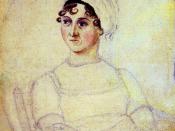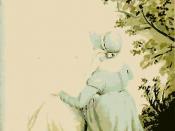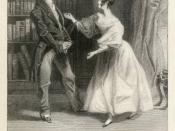Elizabeth Bennet, the female protagonist in Pride and Prejudice, is revolutionary in that she actively rejects the conventions of the time in which it is written. Her determination to choose her own husband, using ÃÂrationalÃÂ Love as her main criteria, deems her as a rebel of her time. This essay will provide evidence for this assertion by refering to the various instances in which she ignores societal standards and restrictions in persuit of true Love. However we must also consider the limits of Elizabeth's rebellion. It becomes clear that Ms. Bennet still conforms to a certain extent, to the expectations of society in some of her attitudes and the choices she makes.
The novel centralises around the Bennetts, a family of five girls and their parents. Mrs. Bennet's primary focus in life is seeing her daughters secured in marriage. This becomes somewhat of an obsession, and the daughters react with a similar urgency to find a husband.
This is in keeping with the times in which the novel was written, when the value of a woman was rooted almost entirely in that of her husband. This attitude is confirmed throughout pride and prejudice. When Mr. Bingley, who is rumoured to be ÃÂhandsomeÃÂ and ÃÂin possession of good fortuneÃÂ appears in the plot, he is immediately targeted as a potential husband for one of the Bennet girls (Austen 1966:1). The whole household is up in arms about his arrival in the neighbourhood. Similar uproar is created by the emergence of numerous other men including Mr. Darcy (who is said to earn twice as much as Mr. Bingley) and Mr. Wickham who though he is not wealthy like the others, appears to be particularly ÃÂagreeableÃÂ (Austen 1966:123).
A constant fear that not all of her daughters will find husbands,


